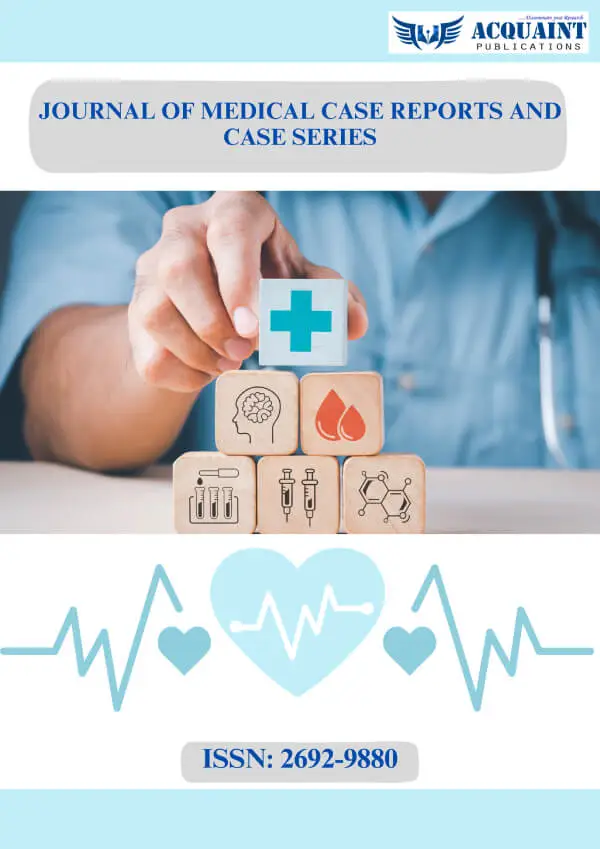Chloe Arima MD*
Internal Medicine, PGY-2, Loyola MacNeal Hospital, Berwyn, IL 60402, United States
*Corresponding Author: Chloe Arima MD, Internal Medicine, PGY-2, Loyola MacNeal Hospital, Berwyn, IL 60402, United States.
Abstract
Summary: We report a case of atorvastatin-induced pancreatitis, with common causes of acute pancreatitis, including excessive alcohol use, gallstones, and hypertriglyceridemia, being excluded in this patient. After atorvastatin was withheld, the patient’s acute pancreatitis clinically improved, significantly decreasing lipase and amylase levels.
Introduction
Background
Atorvastatin is an HMG-CoA reductase inhibitor commonly used to treat hyper-cholesterolemia. Physicians have increasingly prescribed the statin class of medications due to their minimal side effects and mortality and morbidity benefits for preventing primary and secondary cardiovascular disease [1]. The most common adverse effects of statin use include myalgias, elevated liver function tests, and, less commonly, rhabdomyolysis. Atorvastatin-induced acute pancreatitis is a rare and poorly studied side effect, with a reported incidence of approximately 0.91 % of patients [2,3].
Case Presentation
A 68-year-old male with Diabetes Mellitus Type 2 on metformin and Hyperlipidemia on atorvastatin presented to the Emergency Department after being found unresponsive on the floor of his apartment. There was no family history of pancreatitis, recent surgeries, weight loss, or signs of penetrating trauma. The patient’s brother presented at the bedside after admission and stated that the patient had no recent trauma or surgeries. He further denied that there was a family history of any autoimmune diseases. The brother also reported that the patient had been taking atorvastatin for approximately one year. Upon initial evaluation, the patient’s lipase was elevated to 5,333. Amylase levels were also promoted to 497. Alcohol levels were not detected, triglyceride levels were mildly elevated at 191, and gallbladder ultrasound showed cholelithiasis without biliary duct dilatation or inflammation. Liver function tests were within normal limits. An abdominal CT scan was done, reported as a complex study, but interestingly, it did not comment on any acute changes in the pancreas. The patient’s atorvastatin was held, and the patient was treated with aggressive intravenous fluid resuscitation. During the hospitalization, lipase levels down trended to 1,410 after the first day, and amylase levels down trended to 70 after two days.
Discussion
Acute pancreatitis can have many causes, but the most frequently seen is acute pancreatitis due to excessive alcohol use, hypertriglyceridemia, and gallstones. Other causes include recent ERCP, autoimmune disorders, abdominal trauma or surgery, steroid use, mumps, malignancy, scorpion stings, hypercalcemia, and certain drugs such as Hydrochlorothiazide, Azathioprine, Didanosine, and Trimethoprim- Sulfamethoxazole. Atorvastatin-induced acute pancreatitis has been found in a few case reports used alone or in combination with other medications, with a reported incidence of approximately 0.91 % of patients [2,3]. Little data studies the relationship between atorvastatin and acute pancreatitis, but the incidence of statin-induced acute pancreatitis is rising due to the increased use of statins worldwide. The pathophysiology remains unclear but seems to be related to class use [4].
Learning Points
Atorvastatin is an HMG-CoA reductase inhibitor commonly prescribed by physicians to treat hypercholesterolemia by reducing low-density lipoprotein cholesterol, with research showing many cardiovascular benefits [1]. There has been an increase in case reports about atorvastatin-associated acute pancreatitis. [4] Clinically, physicians should consider the possibility of atorvastatin-associated acute pancreatitis if there is no definite etiology, and more literature and research are needed to investigate this association further.
References
- Rocha HAL, Alcântara ACC, Rocha SGMO, Toscano CM (2018) Effectiveness of Rapid Response Teams in Reducing Intrahospital Cardiac Arrests and Deaths: A Systematic Review and Meta-Analysis. Revista Brasileira de Terapia Intensiva. 30(3): 366-375.
- Singh S, Nautiyal A, Dolan JG (2004) Recurrent acute pancreatitis possibly induced by atorvastatin and rosuvastatin. Is statin induced pancreatitis a class effect? JOP. 5(6): 502-4.
- Prajapati S, Shah S, Desai C, Desai M, Dikshit RK (2010) Atorvastatin-induced pancreatitis. Indian J Pharmacol. 42(5): 324-5.
- Johnson JL, Loomis IB (2006) A case of simvastatin-associated pancreatitis and review of statin-associated pancreatitis. Pharmacotherapy. 26(3): 414-22.



